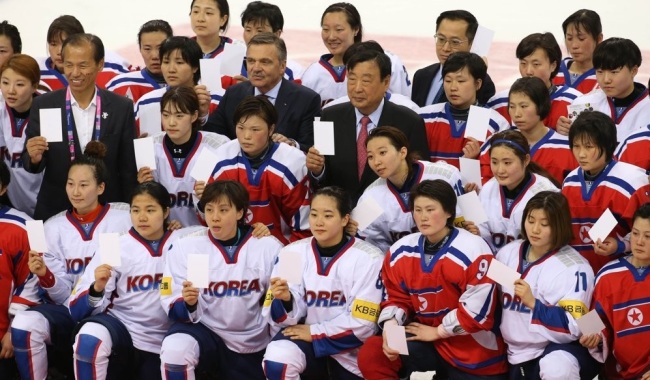While the government celebrates Wednesday’s inter-Korean agreement on the PyeongChang Olympic Winter Games as a step forward in creating a “peace Olympics,” controversies and potential pitfalls remain.
On Wednesday, the two Koreas agreed on a range of issues on North Korea’s participation in the games, including the use of the “Korean Unification” flag at the opening ceremony and forming a unified women’s ice hockey team. The two sides also agreed to hold a training session for non-Olympian skiers in North Korea, and joint cultural events.
While some lauded this as a leap forward in inter-Korean relations, the measures have raised a number of thorny issues.
One of the more difficult issues is the matter of sanctions imposed on North Korea by Seoul and the international community.
In a report, the Asan Institute of Policy Studies raised a range of scenarios in which sanctions could be violated, or be considered as weakened by the North’s participation.
The report raised the possibility that sanctions could be violated should North Korea demand financial support in the process of preparing to send its delegation, performance troupe and other groups that Pyongyang agreed to send.
The report also raised the possibility of figures subjected to international sanctions being chosen to lead the high-level delegation. Such individuals visiting South Korea could give the impression that international sanctions are being weakened, the report said, and the significance of their presence here cannot be taken as being limited to the games.
“International and unilateral sanctions are part of the pressure on North Korea and as they (high level delegates) are North Korea’s top policymakers, it is difficult to view them as being free of responsibility in North Korea’s missile and nuclear programs,” the report said.
South Korea’s Ministry of Unification, however, played down such concerns without providing much details.
“The current issue is unrelated to (potentially allowing) visits to North Korea in the long term, or some form of economic cooperation projects,” Vice Minister of Unification Chun Hae-sung said Wednesday. He added that previous South Korean administrations had also sought social and cultural exchanges with North Korea within the framework of sanctions.
“(Seoul) will make preparations to ensure that no controversies relating to sanctions and May 24 measures are raised.”
May 24 measures refer to the prohibition of all inter-Korean activities imposed by the South Korean government in 2010 after the sinking of the warship Cheonan by the North.
The plan to hold a training session for South and North Korean skiers at the Masikryong Ski Resort in North Korea has also raised criticism.
Completed in 2013, Pyongyang promotes the resort as a landmark achievement of North Korean leader Kim Jong-un. The international community has also heavily criticized North Korea for carrying out the extravagant project while the majority of its population lives in poverty.
In a radio interview, a former National Intelligence Service official said that using the facilities would lead to a violation of international sanctions.
“The daily fee for using the resort is $35 per person, and the hotel costs about $300 (per night). The facilities cannot be used without payment. If such large sums are paid, it is a clear violation of UN Security Council sanctions,” Kim Jung-bong, a former NIS official, said in a radio interview Thursday.
Even the seemingly simpler issue of forming a joint women’s ice hockey team is not without difficulties.
On Wednesday, before the agreement, a local hockey fan filed a petition to the National Human Rights Commission claiming that a joint team would violate South Korean athletes’ rights.
The petitioner, identified by the surname Hong, claims that a joint team would result in South Korean players’ playing time being reduced.
While the International Olympic Committee has yet to approve the plans, a number of objections have already been raised both at home and abroad.
South Korea’s opposition parties have attacked Prime Minister Lee Nak-yeon over his comment suggesting that there is a low likelihood of the South Korean women’s hockey team winning an Olympic medal.
At a press event on Tuesday, Lee attempted to play down the controversies by saying that rankings of South and North Korean teams do not suggest the high likelihood of medals, and that South Korean players were in general welcoming the idea.
The opposition parties jumped at Lee’s earlier comment, accusing the Moon administration of viewing the games as a political opportunity and of brushing aside the rights of South Korean athletes.
While human rights issues are raised at home, Switzerland, whose women’s hockey team will face South Korea on Feb. 10, has expressed discontent at the idea of giving the unified Korean team a larger roster.
“In terms of sports and for all teams who invest a lot of money and resources in their women’s teams, we are not in favor of this since it’s not fair and distorts competition,” Janos Kick, head of communications at the Switzerland Ice Hockey Federation, was quoted as saying by a local news agency.
By Choi He-suk (
cheesuk@heraldcorp.com)


![[PyeongChang 2018] NK to participate in four sports at PyeongChang 2018](http://res.heraldm.com/phpwas/restmb_idxmake.php?idx=605&simg=/content/image/2018/01/18/20180118000728_0.jpg)
![[PyeongChang 2018] Seoul defends joint training at NK ski resort as part of efforts for 'Peace Olympics'](http://res.heraldm.com/phpwas/restmb_idxmake.php?idx=605&simg=/content/image/2018/01/18/20180118000714_0.jpg)




![[Exclusive] Hyundai Mobis eyes closer ties with BYD](http://res.heraldm.com/phpwas/restmb_idxmake.php?idx=644&simg=/content/image/2024/11/25/20241125050044_0.jpg)
![[Herald Review] 'Gangnam B-Side' combines social realism with masterful suspense, performance](http://res.heraldm.com/phpwas/restmb_idxmake.php?idx=644&simg=/content/image/2024/11/25/20241125050072_0.jpg)

